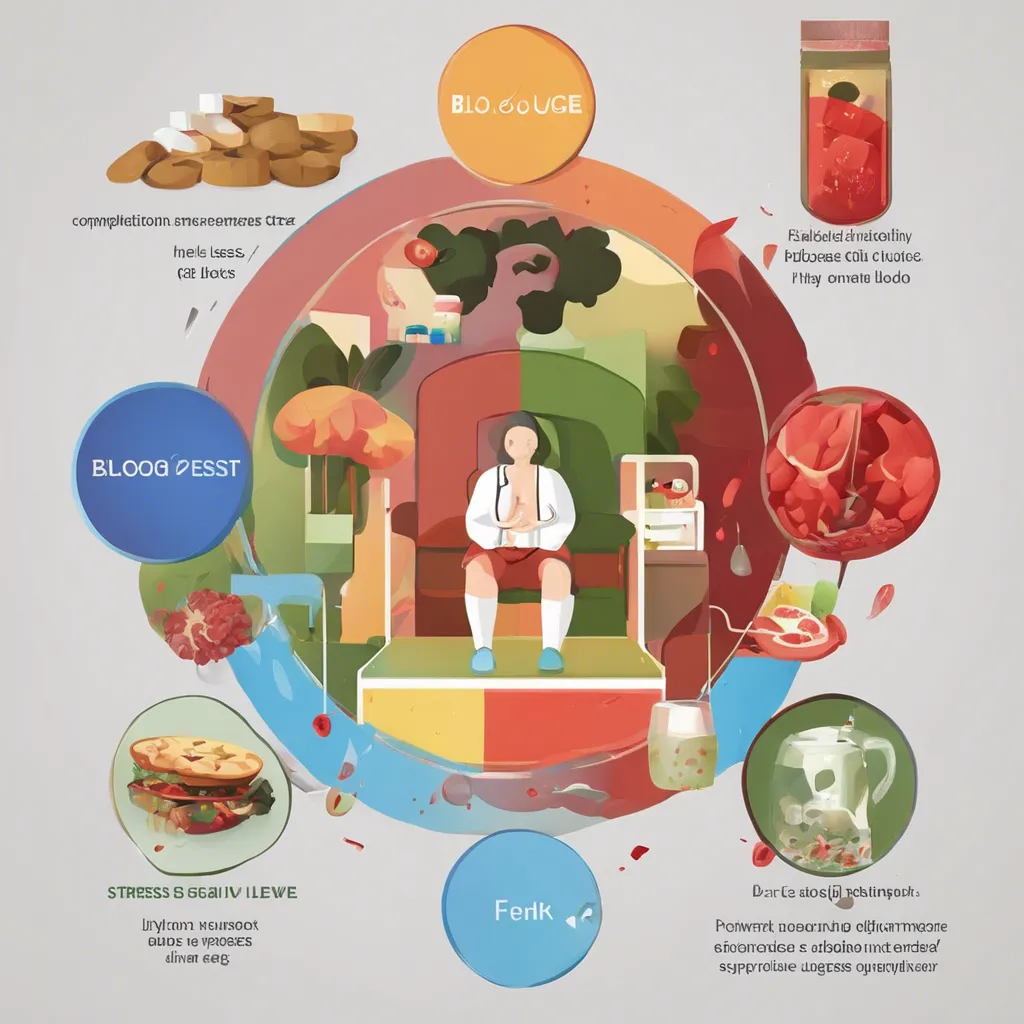Table of contents
- Unveiling the Link Between Stress and Blood Sugar Levels
- How to Manage Blood Sugar with Healthy Eating Habits
- Simple Lifestyle Changes to Lower Blood Sugar
- Expert Strategies for Managing Blood Sugar Levels
- Delicious and Nourishing Meals to Regulate Blood Sugar
Stress is a common occurrence in our modern lives, and it can have a profound impact on our overall health. One area that is particularly affected by stress is our blood sugar levels. In this article, we will delve into the connection between stress and blood sugar, exploring how chronic stress can lead to imbalances and potentially contribute to conditions like diabetes. Additionally, we will explore natural solutions that can help regulate blood sugar and mitigate the effects of stress on our bodies.
Unveiling the Link Between Stress and Blood Sugar Levels
Stress can lead to an increase in blood sugar levels. When stressed, the body releases cortisol and adrenaline, which cause the liver to release stored glucose into the bloodstream. This can have negative effects on individuals with diabetes or insulin resistance.
How to Manage Blood Sugar with Healthy Eating Habits
Maintaining a balanced diet is key to effectively regulating blood sugar levels. When it comes to managing blood sugar with healthy eating habits, a balanced diet plays a crucial role in providing the necessary nutrients and stabilizing glucose levels. Here are some important points highlighting the significance of a balanced diet for regulating blood sugar:
-
Controlled Carbohydrate Intake
A balanced diet emphasizes consuming complex carbohydrates rather than simple sugars. Complex carbohydrates, found in whole grains, legumes, and fruits, are digested more slowly, preventing sudden spikes in blood sugar levels. This allows for better regulation of blood glucose.
-
Protein for Sustained Energy
Including adequate protein in a balanced diet helps slow down the digestion of carbohydrates. This slows the release of glucose into the bloodstream and promotes stable blood sugar levels throughout the day.
-
Healthy Fat Consumption
Incorporating sources of healthy fats, such as avocados, nuts, and olive oil, in a balanced diet is beneficial for blood sugar regulation. Healthy fats help improve insulin sensitivity and reduce the risk of insulin resistance.
-
Fiber-Rich Foods
Fiber-rich foods, including vegetables, fruits, and whole grains, are essential for managing blood sugar levels. The soluble fiber in these foods slows down carbohydrate digestion and absorption, preventing rapid increases in blood sugar.
-
Portion Control
Maintaining portion sizes is crucial for balancing blood sugar. Consuming smaller, more frequent meals and snacks can help prevent blood sugar spikes. It allows the body to regulate glucose more effectively and promotes stable blood sugar levels throughout the day.
Simple Lifestyle Changes to Lower Blood Sugar
Regular exercise plays a significant role in managing blood sugar levels. By incorporating this simple lifestyle change into your routine, you can effectively lower blood sugar levels and improve overall health. Here are some key points regarding the impact of regular exercise on blood sugar levels:
- Improved insulin sensitivity: Regular exercise increases your body's sensitivity to insulin, allowing it to work more effectively in regulating blood sugar levels. This helps to prevent spikes or drops in glucose levels.
- Increased glucose uptake: Physical activity stimulates the muscles to take up glucose from the bloodstream, reducing blood sugar levels. It promotes the transport of glucose into the cells, where it is used for energy rather than accumulating in the blood.
- Weight management: Regular exercise helps with weight loss or maintenance, which is crucial for controlling blood sugar levels. It helps to reduce excess body fat, particularly abdominal fat which is linked to insulin resistance and high blood sugar levels.
- Lowered glycated hemoglobin levels: Regular exercise can decrease the levels of glycated hemoglobin (HbA1c) in the blood. HbA1c provides an average of blood sugar levels over a 2-3 month period, and maintaining it within a healthy range is vital in diabetes management.
- Improved cardiovascular health: Exercise strengthens the heart, improves circulation, and reduces the risk of cardiovascular diseases. People with diabetes are prone to heart-related complications, and regular exercise can mitigate these risks.
- Stress reduction: Physical activity is known to reduce stress levels and improve mental well-being. Stress hormones can raise blood sugar levels, so incorporating exercise into your routine helps with managing stress and maintaining healthy blood sugar levels.
- It is important to consult with a healthcare professional before starting an exercise program, especially if you have diabetes or any other underlying health conditions. They can provide personalized recommendations and advise on the appropriate intensity, duration, and type of exercise for your individual needs.
Expert Strategies for Managing Blood Sugar Levels
Managing blood sugar levels is crucial for individuals living with diabetes or prediabetes. To help you navigate this process, healthcare professionals offer valuable advice and strategies for effective blood sugar management.
-
Regular Blood Sugar Monitoring
Healthcare professionals recommend regular monitoring of blood sugar levels to stay informed about your current status. This involves using a blood glucose meter to test your blood sugar at various times throughout the day.
-
Balanced and Nutritious Diet
Following a balanced and nutritious diet is key to managing blood sugar levels. Healthcare professionals advise incorporating whole grains, fruits, vegetables, lean proteins, and healthy fats into your meals. Limiting the consumption of sugary and processed foods is also essential.
-
Regular Exercise
Engaging in regular physical activity is highly beneficial for blood sugar management. Healthcare professionals suggest at least 30 minutes of moderate-intensity exercise, such as brisk walking or cycling, most days of the week. Exercising helps lower blood sugar levels and improves insulin sensitivity.
-
Medication and Insulin Use
For individuals who require medication or insulin to manage blood sugar levels, it is important to follow the prescribed dosage and timing as advised by healthcare professionals. Regularly monitoring your blood sugar can help determine if any adjustments are needed.
-
Stress Management
Stress can affect blood sugar levels, so managing stress is crucial. Healthcare professionals recommend practicing relaxation techniques like deep breathing, meditation, or engaging in hobbies and activities that help reduce stress.
-
Regular Medical Check-ups
Regular check-ups with healthcare professionals are essential for monitoring blood sugar levels, assessing overall health, and making any necessary adjustments to the diabetes management plan. These check-ups help prevent complications and ensure optimal blood sugar control.
Delicious and Nourishing Meals to Regulate Blood Sugar
Maintaining stable blood sugar levels is crucial for overall health. Incorporating healthy recipes into your diet can help regulate blood sugar levels and prevent spikes and crashes. Opt for meals that include a balance of complex carbohydrates, lean protein, and healthy fats. Foods like whole grains, legumes, lean meats, and vegetables are great choices. Incorporate ingredients like cinnamon, turmeric, and garlic, which have been shown to help regulate blood sugar levels. Explore recipes that focus on natural, unprocessed ingredients to nourish your body and maintain stable blood sugar levels.
In conclusion, stress can have a significant impact on blood sugar levels. Chronic stress can lead to higher blood sugar levels and an increased risk of developing type 2 diabetes. However, there are natural solutions that can help mitigate the effects of stress on blood sugar, such as regular exercise, adequate sleep, stress management techniques, and a healthy diet. These lifestyle changes, along with proper medical management, can play a crucial role in maintaining optimal blood sugar levels and overall well-being. It is important to recognize the relationship between stress and blood sugar and take proactive steps to manage stress effectively for better health outcomes.
Frequently asked questions related to effects of stress on blood sugar
What is the impact of stress on blood sugar?
Stress can cause an increase in blood sugar levels. When we are stressed, our body releases stress hormones, such as cortisol, which can lead to elevated blood sugar. This happens because cortisol triggers the liver to release stored glucose into the bloodstream for energy. Over time, consistently high blood sugar levels due to chronic stress can increase the risk of developing diabetes.
What are some natural solutions to manage stress and blood sugar levels?
There are several natural solutions that can help manage both stress and blood sugar levels. Regular exercise, such as walking or yoga, can reduce stress and improve insulin sensitivity. Getting enough sleep is important for regulating stress hormones and blood sugar levels. Practicing relaxation techniques like deep breathing exercises, meditation, and mindfulness can also be beneficial. Eating a balanced diet rich in fruits, vegetables, whole grains, and lean proteins can help stabilize blood sugar levels. Additionally, herbs and supplements like ashwagandha, holy basil, and magnesium may have calming effects on the body and support blood sugar balance.
Can stress management techniques lower the risk of diabetes?
Yes, adopting effective stress management techniques can lower the risk of developing diabetes. By reducing stress levels, it is possible to improve insulin sensitivity and maintain stable blood sugar levels. Managing stress through techniques like exercise, relaxation, and a healthy lifestyle can also prevent the onset of other health complications associated with high blood sugar, such as cardiovascular disease.
Are there any specific foods that can help reduce stress and stabilize blood sugar?
Certain foods can help reduce stress and stabilize blood sugar levels. Foods rich in omega-3 fatty acids, such as salmon, walnuts, and chia seeds, have been shown to have anti-inflammatory effects on the body and promote brain health, which can help manage stress. Additionally, complex carbohydrates found in whole grains, legumes, and vegetables can provide a steady release of glucose into the bloodstream, preventing spikes in blood sugar. Including foods rich in magnesium, such as leafy greens, nuts, and seeds, may also help regulate stress levels and blood sugar.
How does stress affect insulin production?
Stress can interfere with insulin production and its effectiveness in regulating blood sugar. Chronic stress can reduce the production of insulin, leading to insulin resistance. Insulin resistance occurs when cells in the body become less responsive to the effects of insulin, resulting in higher blood sugar levels. Additionally, stress hormones like cortisol can inhibit insulin's ability to work properly, making it harder for cells to take in glucose and lowering insulin sensitivity.







